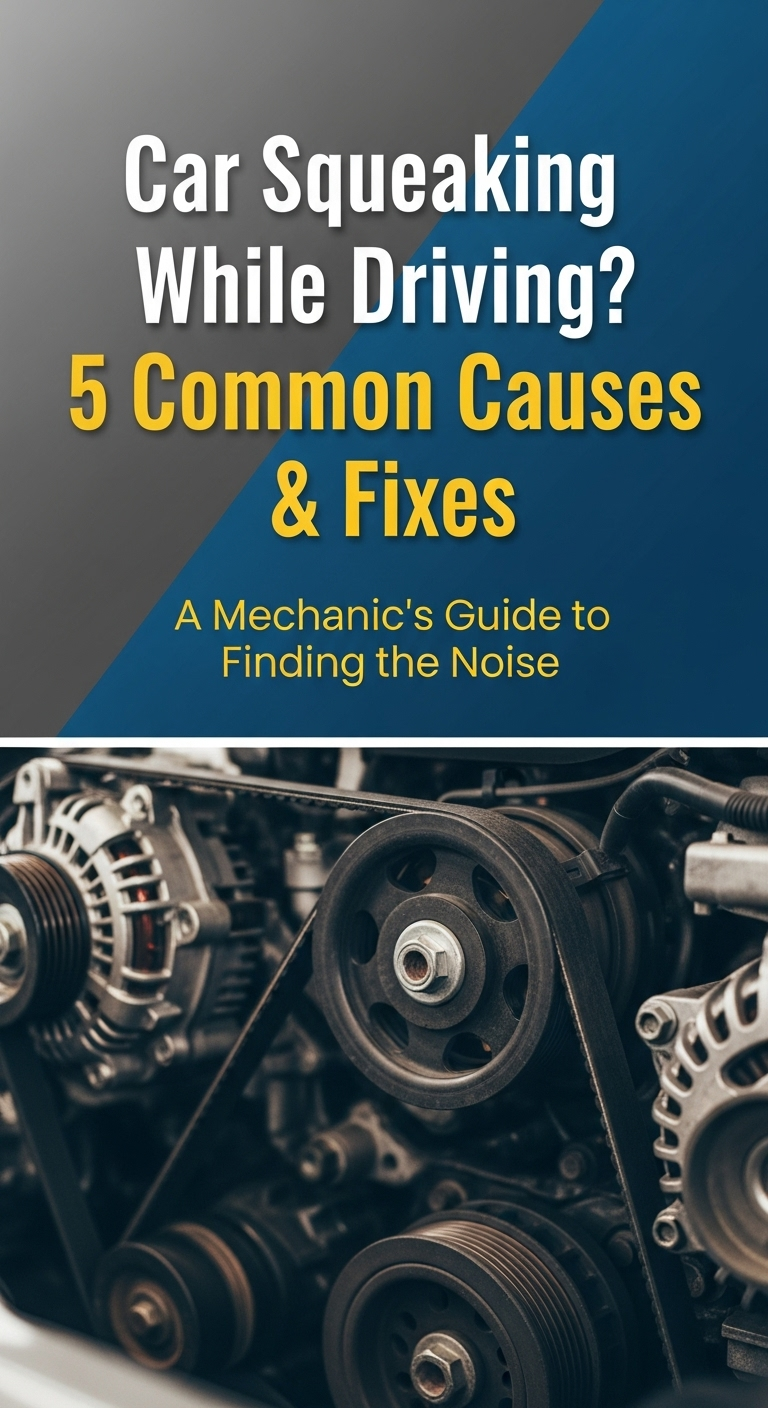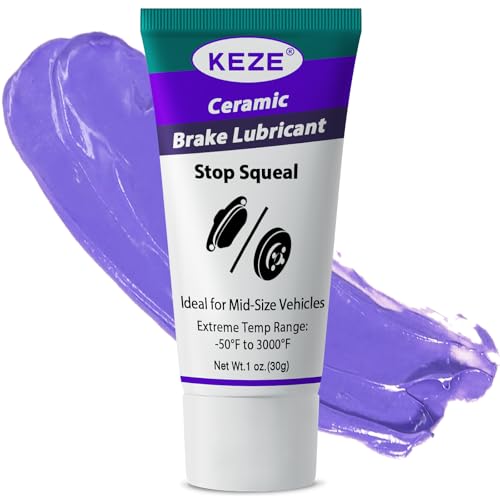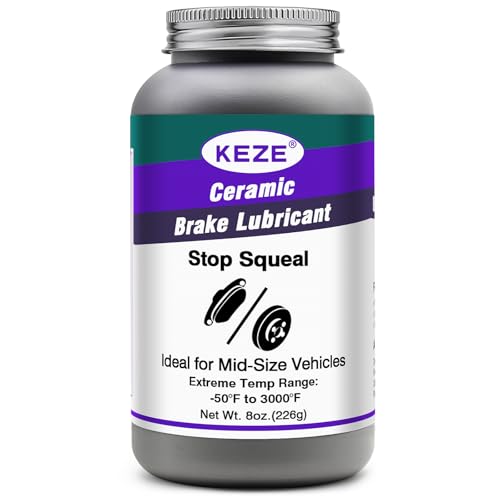That high-pitched squeak is more than just annoying—it’s your car trying to tell you something. But what is it saying? The answer can range from a simple fix to a critical warning about your vehicle’s safety and could be the difference between a small bill and costly repairs.
A car squeaking while driving is a signal of a problem ranging from minor (brake dust) to serious (failing brakes or belts). Ignoring it can compromise safety and lead to expensive repairs.
Leveraging extensive analysis of automotive repair data and established mechanical patterns, this guide unpacks the common causes behind that persistent squeak. We will walk you through the diagnostic process used by professionals, helping you identify the likely source of the noise and understand the necessary steps to fix it, ensuring your peace of mind and safety on the road.
Key Facts
- Brakes Are the Top Suspect: The most frequent cause of a car squeaking while driving is the brake system, with worn brake pads being the primary culprit, as noted by numerous automotive repair sources.
- Ignoring the Squeal Is Costly: Letting a brake pad wear indicator squeal for too long can lead to metal-on-metal grinding, damaging rotors and calipers, which can multiply repair costs significantly.
- Belt Failure Is a Critical Risk: A broken serpentine belt, often preceded by a high-pitched squeal, can cause an immediate loss of power steering and lead to rapid engine overheating, creating a dangerous situation.
- Bumps Tell a Story: If the squeaking noise primarily occurs when you drive over bumps or uneven terrain, it’s a clear indication of a problem with your suspension system, such as worn-out bushings or shocks.
- Repair Costs Vary Wildly: Fixing a squeak can be inexpensive, sometimes under £10 for a fluid top-up, but can also escalate into thousands for major suspension or engine work if the initial warning signs are ignored.
First, Answer the Critical Question: Is It Safe to Drive?
Before trying to diagnose the problem, you need to assess the immediate risk. A squeak can be a minor annoyance or a critical safety warning. Use this expert-informed guide to triage the situation.

| Symptom | Potential Risk Level | Recommendation |
|---|---|---|
| Intermittent squeak, no other symptoms | Low | Likely safe for a short drive to a mechanic. Monitor closely. |
| Squeak is constant but doesn’t affect performance | Moderate | Avoid long trips. Schedule a professional inspection as soon as possible. |
| Squeak occurs with braking/steering/acceleration | High | Driving is not recommended. The system involved could fail. |
| Squeak is loud/grinding, with performance loss | Critical | Do not drive. Pull over safely and call for roadside assistance. |
Pro Tip: If the squeak is accompanied by a warning light on your dashboard, pull over as soon as it’s safe and call for assistance.
The Diagnostic Step: Pinpoint When the Squeaking Happens
Your car is giving you clues. Listening to when the squeak happens is the single most effective way to narrow down the potential cause. Take a moment to think: Does the noise change or appear only under specific conditions? Your answer is the key.
- Squeaking when braking: This points directly to the brake system.
- Squeaking when turning the steering wheel: This strongly suggests an issue with the steering system, likely low power steering fluid.
- Squeaking over bumps: The noise is almost certainly coming from your suspension system.
- Squeaking when accelerating or at startup: This is a classic sign of a problem with your engine’s belts or pulleys.
- Squeaking constantly while driving: This could be a wheel bearing or a brake component like a seized caliper.
Cause #1: Brake System Issues (The Most Common Culprit)
Based on consensus from a dozen different automotive sources, the brake system is the number one reason for a car squeaking while driving. That high-pitched noise is often a built-in warning sign.
- Worn Brake Pads: This is the leading cause. Most brake pads are designed with a small metal tab called a wear indicator. When the pad material wears down to a certain level, this tab makes contact with the brake rotor, creating a loud, high-pitched squeal to alert you that it’s time for a replacement.
- Worn or Warped Rotors: Brake rotors can become uneven, glazed, or corroded over time. When the brake pads press against this imperfect surface, it can cause vibration and squealing.
- Seized Brake Caliper: A brake caliper can get stuck, forcing a brake pad to remain in contact with the rotor constantly. This causes a persistent squeak even when you aren’t pressing the brake pedal.
- Brake Dust and Debris: Sometimes, the cause is as simple as an accumulation of brake dust, dirt, or a small stone trapped between the pad and rotor, causing friction and noise.
A “brake wear indicator” is a small piece of metal embedded in a brake pad. It is specifically engineered to be a warning system. When the pad wears down, the indicator scrapes against the spinning rotor, producing an unmistakable high-pitched squeal. This sound is your cue to get your brakes serviced immediately.
Quick Fact: That high-pitched squeal from your brakes is often by design! It’s the wear indicator telling you it’s time for new pads before costly rotor damage occurs.
When Brakes Squeak Without Pressing the Pedal
It seems counterintuitive, but a squeak that happens while you’re just cruising down the road often still points to the brakes. This is a common question mechanics hear, and there are two primary reasons for it:
- Seized Brake Caliper: As mentioned above, a stuck or “seized” caliper doesn’t retract properly after you release the brake. This keeps the brake pad in constant, light contact with the rotor, generating a continuous squeak.
- Early-Stage Wear Indicator Contact: Sometimes, a brake wear indicator that is just beginning to make contact won’t squeal all the time. It might only touch the rotor intermittently as the wheel spins, creating a squeak that comes and goes as you drive.
Cause #2: Worn or Loose Belts & Pulleys
If the squeaking while driving is a high-pitched squeal that gets louder when you accelerate or first start the car, the culprit is likely in your engine’s belt system. Does the squeal get louder or change pitch when you turn on your A/C? That’s a classic sign of a belt issue.
- Serpentine Belt: This long, rubber belt powers crucial accessories like your alternator, power steering pump, and air conditioning compressor. Over time, it can dry out, crack, or become loose. When this happens, it slips on the pulleys, creating a loud squeal. A broken serpentine belt can cause immediate loss of power steering and engine overheating.
- Pulleys: The serpentine belt runs on a series of pulleys. The bearings inside these pulleys (like the idler pulley or tensioner pulley) can wear out, causing a squeaking or grinding noise as they spin. Misalignment of a pulley can also cause the belt to rub and squeal.
- Timing Belt (or Cambelt): While less common to cause a squeak, a worn or improperly tensioned timing belt can sometimes make noise. A failure of this belt is catastrophic for an engine, so any suspected issue should be addressed immediately. Most manufacturers recommend replacing belts every 50,000 miles or so.

Cause #3: Suspension System Components
If you primarily hear a car squeaking when you go over bumps, speed bumps, or dips in the road, the problem is in your suspension. The components that absorb road impacts are wearing out.
- Shocks and Struts: Worn-out shock absorbers or struts can cause squeaking as the internal components lose their ability to dampen movement smoothly.
- Bushings: Your suspension system has many rubber bushings that cushion metal parts. Over time, this rubber dries out, cracks, and hardens. This loss of lubrication causes metal-to-metal contact, resulting in loud squeaks when the suspension flexes. Think of bushings as the cartilage in your car’s joints; when they wear out, you get noise.
- Ball Joints: These are critical pivot points in your suspension and steering systems. When they wear out and lose their grease, they can create a creaking or squeaking sound, especially during turns or over bumps.
- Sway Bar Links: These links connect the sway bar to the rest of the suspension. The small joints and bushings on these links can wear out and cause noise as the vehicle’s body rolls.
Pro Tip: A quick visual inspection can sometimes spot cracked or worn rubber bushings in your suspension system.

Cause #4: Steering System Problems
A squeak that appears or gets significantly louder specifically when you turn the steering wheel is a direct message from your power steering system.
Symptom: Squeak only when turning the wheel?
Likely Cause: Low or contaminated power steering fluid. The fluid acts as a lubricant for the power steering pump. When it’s low, the pump works harder and creates a whining or squealing noise. A failing power steering pump itself can also make a distinct groaning or squealing sound when put under the load of a turn.
Cause #5: Other Potential Squeak Sources
If the noise doesn’t fit neatly into the categories above, there are a few other culprits to consider to fully solve the mystery of why is my car squeaking while driving.
- Worn-Out Wheel Bearings: A bad wheel bearing typically starts as a faint hum or grinding noise that gets progressively louder with speed. In some cases, it can manifest as a high-pitched squeal that worsens during turns as the load on the bearing changes.
- Tires and Alignment: Though less common, severe tire misalignment can cause the tires to scrub against the pavement during turns, creating a squealing sound. Similarly, severely underinflated tires can also produce squeaks.
- General Lubrication: Sometimes, a simple squeak can come from a part that just needs a bit of grease.
In some cases, squeaking on bumpy roads can even come from dry tailgate hinges or door latches. This insight from Mechanics Stack Exchange shows that sometimes the source is less obvious than you might think.
To tackle some of these issues yourself, such as lubricating components or checking fluids, having the right products on hand is essential.
FAQs About Car Squeaking Noises
Why does my car squeak when driving slow but not fast?
Squeaking at low speeds is often due to brake component vibration (from dust or lack of lubrication) or worn suspension bushings flexing under load. At low speeds, there isn’t enough momentum or wind noise to mask these subtle friction sounds, and certain vibrations only occur in a specific, low-frequency range that disappears as you speed up.
What if the squeak is only on the left or right side?
A squeak from one side is a great diagnostic clue because it isolates the problem to components on that specific wheel. The most likely culprits are:
* The brake assembly on that side (pads, caliper, rotor).
* The wheel bearing on that corner of the car.
* A suspension or steering joint (like a ball joint or tie rod end) on that side.
Can cold weather cause my car to squeak?
Yes, absolutely. Cold weather can cause temporary squeaks as rubber parts, particularly suspension bushings and serpentine belts, become stiff and less pliable. This is very common, and the noise often disappears completely as the car warms up and the components become more flexible. Moisture from frost or snow can also cause temporary belt squeal.
How much does it cost to fix a car squeak?
Repair costs vary widely depending on the cause. According to data from several auto service providers, a fix could be under £10 for topping up power steering fluid. Replacing worn brake pads can be a couple hundred, while replacing a serpentine belt is usually in a similar range. Major work like replacing suspension components or a failing power steering pump can cost hundreds or even thousands.
Final Summary: Don’t Ignore Your Squeaking Car
That squeaking noise is your vehicle’s way of communicating a need. While it can be tempting to turn up the radio and ignore it, doing so often leads to more severe damage, higher repair bills, and, most importantly, can compromise your safety. By listening to when the squeak happens, you can gain valuable insight into the problem and know what to tell your mechanic.
Here are the three most important takeaways:
* Context is Key: Pinpointing if the squeak happens during braking, turning, accelerating, or over bumps is the fastest way to identify the troubled system.
* Brakes and Belts are Prime Suspects: The vast majority of squeaks come from either worn brake pads (a built-in warning) or a worn serpentine belt (a critical component).
* Early Action Saves Money and Ensures Safety: Addressing a squeak promptly is always cheaper and safer than waiting for a component to fail completely.
Use this guide to diagnose the sound, but remember: when in doubt, have a professional mechanic check it out. Your safety is always the top priority.
Last update on 2025-11-26 / Affiliate links / Images from Amazon Product Advertising API










